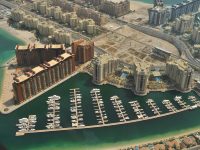Return on Investment (ROI) in the property sector in Dubai
The term Return on Investment (ROI) refers to a key metric that helps investors evaluate the profitability of their investments. In the property sector, especially in a dynamic and fast-paced city like Dubai, it is crucial to understand how to effectively calculate and interpret ROI in order to make successful decisions.
What is return on investment?
Return on Investment (ROI ) is a mathematical formula used to evaluate the profit or loss of an investment in relation to the cost of the investment. It is expressed as a percentage and helps investors to compare different investment opportunities. A high ROI indicates that the investment made is profitable, while a low or negative ROI indicates potential losses.
How is ROI calculated?
ROI is calculated using the following formula:
- ROI (%) = (net income / total cost of investment) x 100
To calculate this figure in the property sector, you need to take into account the net income from the property and the total costs, including purchase price, renovation costs and running costs.
Example calculation for the ROI in Dubai
Let’s assume you buy a residential property in Dubai for AED 500,000. The renovation costs AED 50,000 and the annual rental income is AED 60,000. After one year, the running costs including administration and taxes have risen to AED 20,000. The ROI would be calculated as follows:
- Total investment cost = AED 500,000 + 50,000 = AED 550,000
- Net income = 60,000 – 20,000 = 40,000 AED
- ROI = (40,000 / 550,000) x 100 = 7.27%
An ROI of 7.27% is considered healthy in the property industry, especially in a market like Dubai.
Importance of ROI for investors in Dubai
Return on investment is particularly important for investors in Dubai as the property market here is highly competitive. A meaningful ROI not only gives you insight into the profitability of your investment, but also helps with strategic planning for future investments, such as in new construction or off-plan property purchases.
Factors that influence ROI
Several factors can influence the ROI of a property investment in Dubai:
- Market development: price development in the Dubai property market plays a decisive role.
- Location: Properties in popular areas such as Dubai Marina or Palm Jumeirah often have higher returns.
- Running costs: High running costs can significantly reduce ROI.
Tips for maximising ROI
To maximise ROI, investors should consider the following strategies:
- Invest in up-and-coming residential properties or commercial properties that are expected to increase in value.
- Conduct regular property valuations to keep an eye on market value.
- Selecting the right tenants to minimise downtime and renovation costs.
Illustrative example on the topic: Return on Investment (ROI)
Imagine an investor buys a flat in the city centre of Dubai for AED 800,000. After a few months of renovation work, he invests an additional AED 100,000. At the end of the year, the flat generates rental income of AED 100,000, but the running costs amount to AED 25,000. The net income is therefore AED 75,000. The ROI for this investment is then:
- Total investment cost = AED 800,000 + 100,000 = AED 900,000
- Net income = 100,000 – 25,000 = 75,000 AED
- ROI = (75,000 / 900,000) x 100 = 8.33%
With an ROI of 8.33%, this example shows impressively how a profitable property investment in Dubai can be achieved through careful planning and strategic management.
Conclusion
The return on investment (ROI ) is an indispensable tool for investors in the property sector in Dubai. By analysing and calculating ROI accurately, potential investors can make better decisions and invest successfully in the long term in one of the world’s most dynamic property markets.








